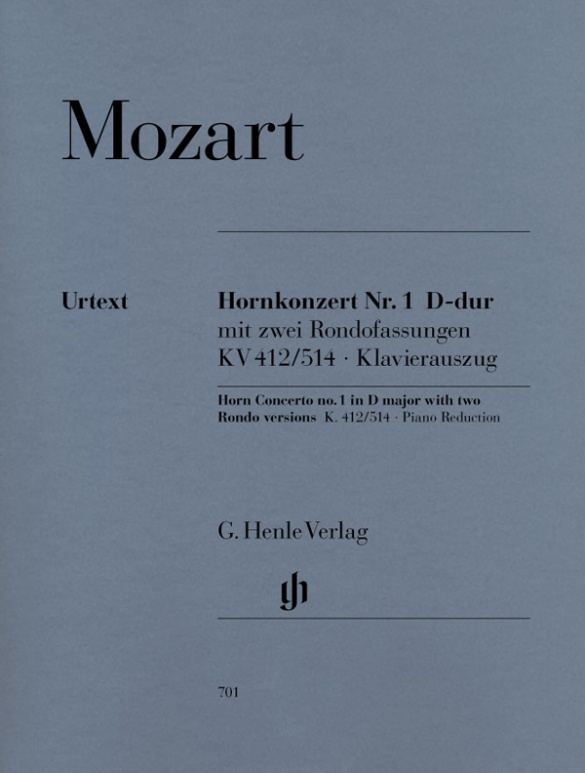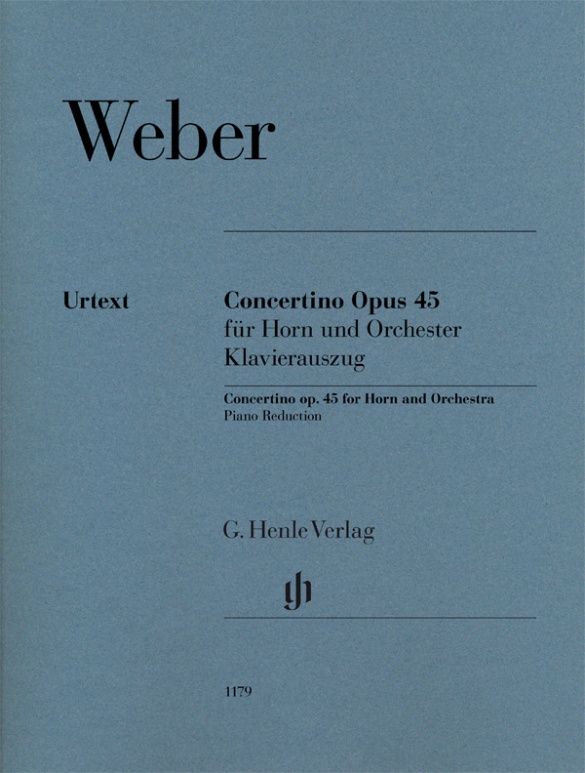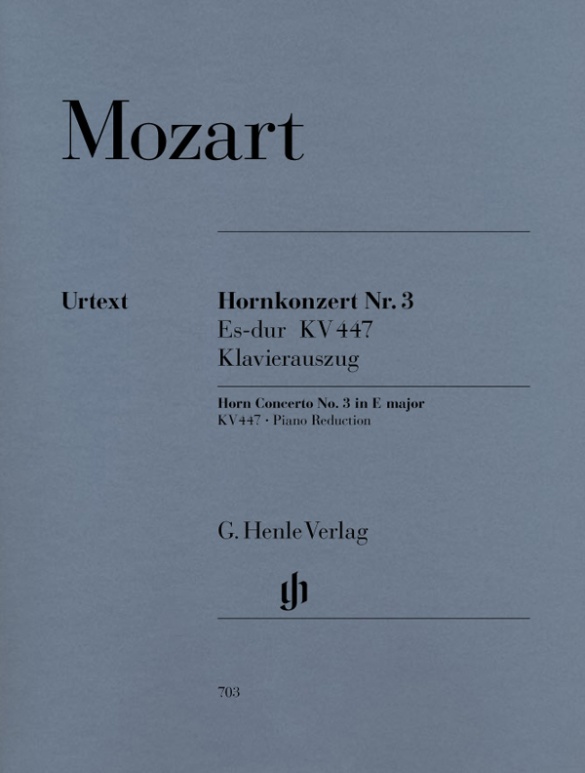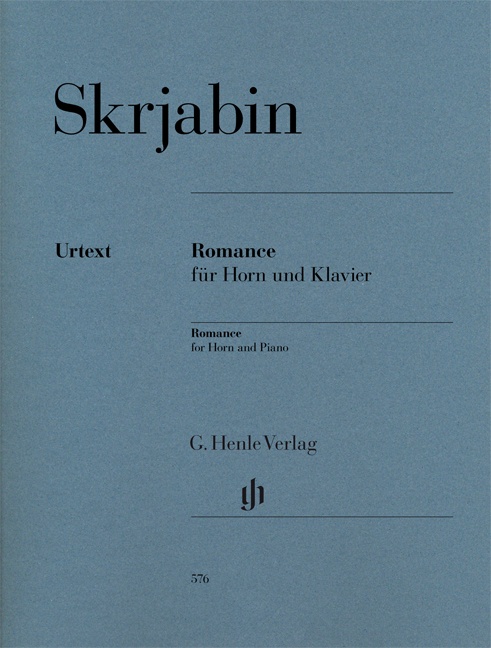

Alexander Skrjabin
Romance for Horn and Piano
Scriabin is mainly known for his mystic-visionary piano works today; but his Romance for horn, which he composed at a young age, is also a charming chamber music work. The technically not very demanding horn part with its opulent piano accompaniment means that it is a very effective recital piece, even for pupils.
As the work was not published during the composer’s lifetime, the autograph is the sole source for our edition. It was prepared in collaboration with the Moscow Scriabin scholar Valentina Rubcova.
Content/Details
About the Composer
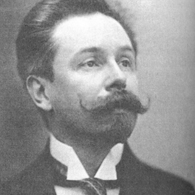
Alexander Skrjabin
Russian composer and pianist. The focal point of his oeuvre is his extremely unique piano music; in addition, he wrote important orchestral works.
| 1872 | Born in Moscow on January 6, the son of a pianist (his mother); she died in 1872. |
| 1888–92 | Piano studies at the Moscow Conservatory |
| 1888–96 | Twenty-four Preludes, Op. 11, containing all the hallmarks of Scriabin’s early period: broad, ornamental cantilenas underpinned by figurations and arpeggios in the style of Chopin, complex rhythmic structure from polyrhythms and syncopations. |
| 1892–1913 | Composition of ten piano sonatas. |
| 1896 | Travels to Paris, Vienna, Rome. |
| 1897 | Piano Concerto in F-sharp minor, Op. 20, in the style of Chopin. |
| 1897–1909/10 | He primarily composes orchestral pieces, including the major works “Le Poème de l’extase” (“The Poem of Ecstasy”) for large orchestra (1905–07), Op. 54, and “Prométhée ou Le Poème du feu” (“Prometheus or The Poem of Fire,” 1908–10); orientation toward Liszt and Wagner; programmatic music with occasional annotations in the musical score, incorporation of philosophical notions into his compositions, which are defined by various philosophical movements from around the turn of the century. Unusual intervals, harmonically at the edge of tonality. |
| 1899–1904 | Composition of his three symphonies, Opp. 26, 29, and 43. |
| 1904 | He resides in Switzerland. |
| 1906 | Invitation to the United States. |
| 1910 | Return to Russia. |
| 1908–10 | “Prométhée ou Le Poème du feu” for piano, orchestra, organ, choir, and clavier à lumière, Op. 60: enrichment of musical performance through plays of light. 1911–14, piano compositions, Opp. 61–74, with avant-garde harmonies. |
| 1913 | Beginning of the multisensory “Acte préalable” (“Prefatory Action”), which is never completed. |
| 1915 | Death in Moscow on April 27. |
About the Authors

Dominik Rahmer (Editor)
Dr. Dominik Rahmer, born in 1971 in Mainz, studied musicology, philosophy and maths in Bonn. He did his Magister Artium in 1999 and his doctorate in 2006 with a thesis on the music criticism of Paul Dukas.
From 2001 to 2011 he was employed at Boosey & Hawkes/Bote & Bock in Berlin, where he also worked on the Critical Edition of the Works of Jacques Offenbach (OEK). Since 2011 he has been an editor at G. Henle Publishers in Munich, with a particular focus on French and Russian music and works for wind instruments.
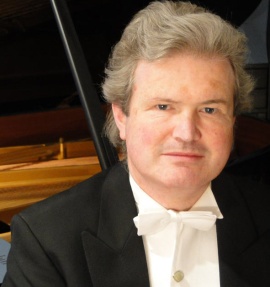
Michael Schneidt (Fingering)
Michael Schneidt, born in Munich, received his piano education at the Staatliche Hochschule für Musik und Theater in Munich, studying with Hugo Steurer and Klaus Schilde. He then completed his artistic state examination with distinction as well as his master-class diploma. He continued his education on a grant from the DAAD with Alessandro Specchi in Florence, also taking master-classes with Paul Badura-Skoda and Bruno Leonardo Gelber. Michael Schneidt has been a prize-winner at international piano competitions (1st prize Viotti-Valsesia, Italy), has done radio and TV broadcasts and also made CD recordings; he has also premiered many contemporary piano works. He has performed in Europe (e.g. at the Prague Spring International Music Festival and at the German Mozart Festival), in Japan and in South America.
Michael Schneidt is Professor of Piano at the Staatliche Hochschule für Musik und Theater in Munich. He has given master-classes in Germany, Switzerland, the Czech Republic and Japan, and is from time to time a member of the jury at music competitions.
Product Safety Informations (GPSR)

G. Henle Verlag
Here you can find the information about the manufacturer of the product.G. Henle Verlag e.K.
Forstenrieder Allee 122
81476 München
Germany
info@henle.de
www.henle.com
Die Romance für Horn und Klavier (...) war meines Wissens bisher nur in einer Gesamtausgabe des Klavierwerks gedruckt erhalten, somit ist eine Neuausgabe dieses einfachen, lyrischen Stücks nur zu begrüßen.
Schweizer Musikzeitung, 2015Una pagina deliziosa da "rinverdire".
Suonare News, 2014Zweieinhalb Minuten schönste Kammermusik, die hier nun endlich im Urtext erscheint – auch dies ein Werk, um das man einen Hornisten beneidet
Sonic, 2013Da ist dem Henle-Verlag eine schöne Ausgrabung gelungen.
Ensemble, 2013recommendations
autogenerated_cross_selling
Further editions of this title
Further editions of this title


